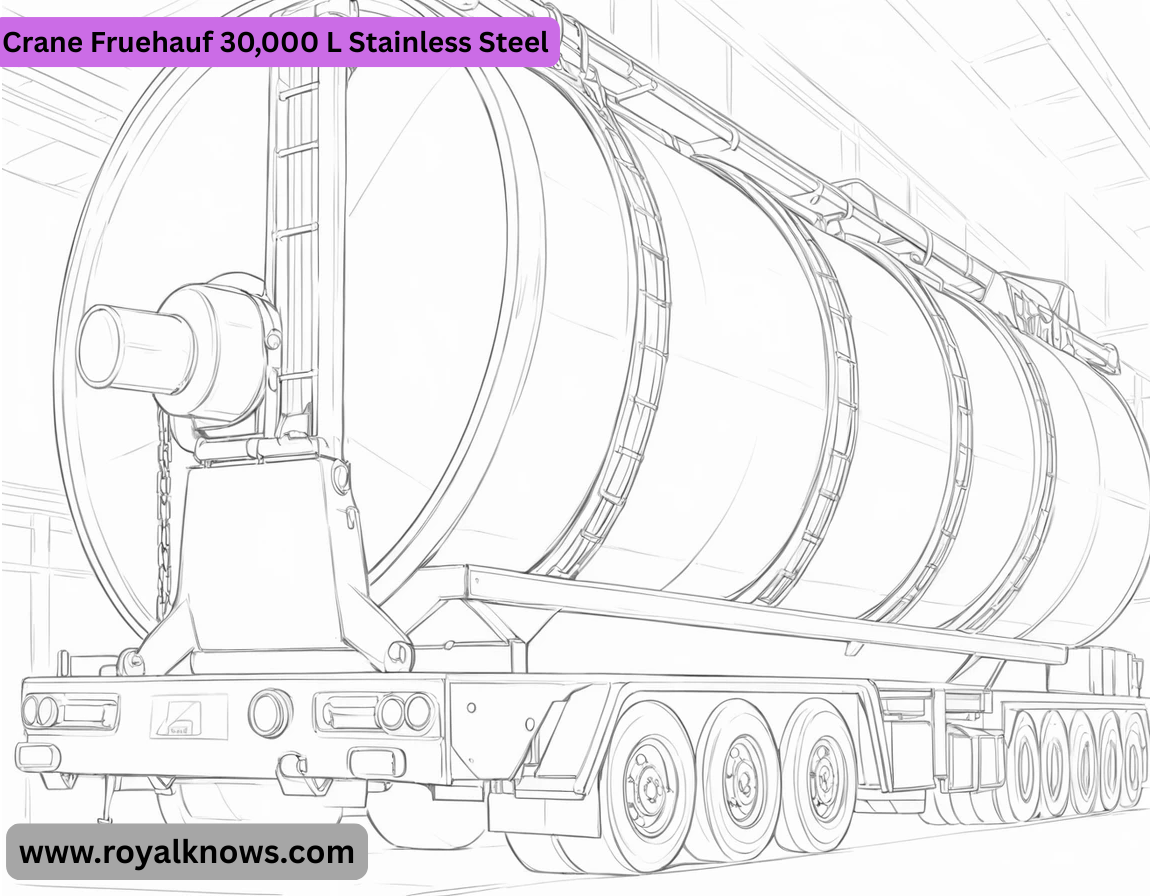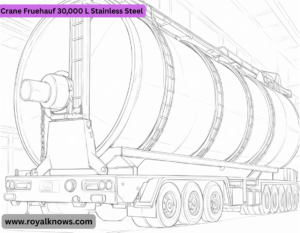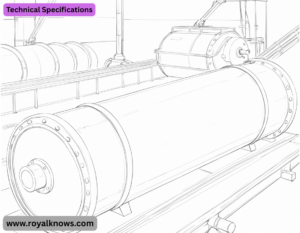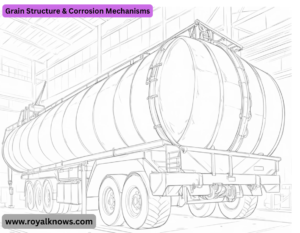Crane Fruehauf 30,000 L Stainless Steel The Crane Fruehauf 30,000 L Stainless Steel tank is a large-capacity, high-quality storage solution designed for industrial applications. Here are some key details about this type of tank:
Key Features:
- Capacity: 30,000 liters (approx. 7,925 gallons)
- Material: Stainless steel (typically 304 or 316 grade for corrosion resistance)
- Design: Cylindrical, often with domed or dished ends for structural integrity
- Applications:
- Chemical storage (acids, solvents, food-grade liquids)
- Pharmaceutical processing
- Food & beverage industry
- Water/wastewater treatment
Fuel/oil storage
- Possible Specifications:
- Pressure Rating: Atmospheric or pressurized (depending on model)
- Insulation Options: Available for temperature-sensitive contents
- Compliance: Meets industry standards (ASME, FDA, EPA if applicable)
- Accessories:
- Manways, vents, agitators (if mixing is required)
- Level indicators, heating/cooling jackets
Manufacturer Background:
- Crane Fruehauf is a well-known manufacturer of industrial tanks and trailers, specializing in high-quality stainless steel and aluminum containers.
- They produce both stationary and mobile (trailer-mounted) tanks for various industries.
Common Uses:
- Transporting or storing bulk liquids (e.g., milk, chemicals, fuels)
- Process tanks in manufacturing
1. Technical Specifications
- Material Grades:
- AISI 304 (1.4301): Standard for food, water, and mild chemicals.
- AISI 316 (1.4401): Superior corrosion resistance (ideal for chlorides, acids, or marine environments).
- Optional 316L for welded structures to prevent carbide precipitation.
- Construction:
- Shell Thickness: Typically 3–6 mm (varies with pressure/load requirements).
- Welding: TIG or MIG, often with internal polishing (Ra ≤ 0.8 µm for sanitary applications).
- Pressure Rating:
- Atmospheric: Open-vented for non-pressurized storage.
- Pressurized: Up to 3–5 bar (custom designs available).
- Insulation:
- Options: Mineral wool, PIR foam, or vacuum panels for cryogenic use.
- Jacketing: Stainless steel or aluminum cladding.
- Fittings & Accessories:
- Heating/Cooling: Electric, steam, or glycol jacketing.
- Sensors: Temperature, pressure, and level (e.g., radar, ultrasonic).
2. Design Standards & Certifications
- Compliance:
- ASME BPVC Section VIII (for pressurized vessels).
- FDA/EC 1935 (food-grade applications).
- PED 2014/68/EU (European pressure equipment directive).
- ADR/RID (if used for hazardous material transport).
- Testing:
- Hydrostatic/pneumatic pressure tests.
- Leak testing (helium or dye penetrant).
- Surface passivation (for corrosion resistance).
3. Applications
- Chemical Industry: Storage of acids (e.g., sulfuric, nitric), solvents, or liquid fertilizers.
- Food & Beverage: Bulk wine, dairy, edible oils, or syrups (sanitary design with CIP systems).
- Pharma/Biotech: High-purity tanks with electropolished interiors.
- Energy: Ad Blue (DEF), biodiesel, or liquid petroleum byproducts.
4. Crane Fruehauf-Specific Details
- Mobility Options:
- Trailer-Mounted: DOT-approved for road transport (with tandem axles, ABS brakes).
- Skid-Mounted: For stationary plant use.
- Customization:
- Explosion-proof designs (ATEX/IECEx for hazardous zones).
- Lined tanks (e.g., PTFE for aggressive chemicals).
5. Procurement Considerations
- Lead Time: 12–20 weeks (custom builds).
- Pricing: ~50,000–150,000+ (varies with material, accessories, and compliance).
- Suppliers:
- Direct from Crane Fruehauf (now part of Crane Co. or successor companies).
- Specialized tank manufacturers (e.g., Poly Processing, Snyder Industries).
6. Maintenance & Lifespan
- Cleaning: Regular CIP (Clean-in-Place) for food/pharma use.
- Inspection: Annual checks for pitting, weld integrity, and seal degradation.
- Lifespan: 20–30 years (with proper maintenance).
1. Engineering & Fabrication Details
Material Science
- Stainless Steel Grades:
- 316/316L: Added 2–3% Mo for chloride/sulfuric acid resistance.
- Duplex 2205: For high-strength, corrosive environments (e.g., offshore).
- Surface Finish:
- 2B Mill Finish: Standard (Ra 0.3–0.5 µm).
- Electropolished (Ra ≤ 0.2 µm): For ultra-sanitary (FDA/SMS 1145).
- Welding Standards:
- PWHT (Post-Weld Heat Treatment) if thickness >10mm.
- Pressure & Vacuum Systems
- Design Options:
- Atmospheric: Venting via breather valves (0.5–1.5 QZ/in²).
- Pressure Vessel: Up to 10 bar (with ASME U stamp).
- Vacuum Jacketed: For cryogenic (e.g., LNG at -162°C).
2. Compliance & Certifications
- Global Standards
- EU: PED 2014/68/EU (Category IV for hazardous fluids).
- ADR/RID: For transport of dangerous goods (Chapters 6.8/6.9).
- China: GB150 (equivalent to ASME).
- Industry-Specific
- 3-A Sanitary: For dairy/pharma (Symbol 09-17).
- EHEDG: Hygienic design for food processing.
- ATEX Directive 2014/34/EU: Zone 0/1 explosion protection.
3. Advanced Applications
- Chemical Processing
- Lined Tanks:
- PTFE (Teflon): For hydrofluoric acid.
- Rubber (e.g., EPDM): For abrasive slurries.
- Agitation Systems:
- Top-Entry Mixers: 5–15 kW motors, 50–200 rpm (for viscosity up to 50,000 CP).
- Energy Sector
- Ad Blue (DEF) Tanks:
- Heating to 25°C (prevent crystallization).
- ISO 22241-1 compliant materials.
4. Procurement & Logistics
- Supplier Landscape
- OEMs:
- Crane Fruehauf (legacy designs; now part of Crane CHEM Pharma).
- Competitors:
- Snyder Industries (sanitary tanks).
- Permian Tank (API 650 for oil/gas).
- Cost Drivers
- Raw Material: 316L costs ~ 3,500/ton(vs.304at2,800/ton).
- Custom Features:
- Insulation: Adds 10,000–30,000.
- Agitator: 15,000–50,000 (depending on torque).
- Lead Time
- Standard: 14–18 weeks.
- Expedited: 8–10 weeks (+20–30% cost premium).
5. Operational Best Practices
- Cleaning & Maintenance
- CIP Systems:
- 4-Step Process: Pre-rinse → Na OH wash → Acid neutralization → Final rinse.
- Flow Rate: 50–100 m³/h (for 30kL tank).
- Inspection:
- UT Thickness Testing: Annual for corrosion mapping.
- DPT/LPT: For weld crack detection.
- Failure Modes
- Stress Corrosion Cracking (SCC): In chloride environments (>50°C).
- Crevice Corrosion: At gasket/seal interfaces.
6. Case Study: Pharma Grade 30kL Tank
- Specs:
- Material: 316L, electropolished (Ra 0.1 µm).
- Pressure: 0.5 bar overpressure / 0.3 bar vacuum.
- Accessories: Tri-Clamp fittings, PTFE diaphragm valves.
- Validation:
- IQ/OQ/PQ Protocols: Per GMP Annex 15.
- SIP (Steam-in-Place): 121°C for 30 mins.
- Next Steps
- Request For Quote (RFQ) Template: Need material certs (MTRs), hydrotest reports, and P&ID.
- Engineering Review: Finite Element Analysis (FEA) for seismic zones.
1. Metallurgical Deep Dive
- Crane Fruehauf 30,000 L Stainless Steel Grain Structure & Corrosion Mechanisms
- ASTM A240 Compliance:
- Ferrite content <0.5% (prevent σ-phase embrittlement at 600-900°C)
- Delta ferrite mapping per WRC-1992 diagram for weld zones
- Intergranular Corrosion Protection:
- Solution annealing at 1050°C + water quench (for 316L)
- ASTM A262 Practice E (Streicher test) for sensitization resistance
2. Computational Engineering Analysis
- Finite Element Modeling (FEM)
- Load Cases:
- Hydrostatic + seismic (ASCE 7-22, Zone 4 with Sₛ=1.5g)
- Wind loading (140 mph per ASCE 7-16 Chapter 29)
- Stress Concentrations:
- Nozzle junctions analyzed per WRC 107/537
- Fatigue analysis for 100,000 cycles (DNV GL RP-C203)
- Computational Fluid Dynamics (CFD)
- Mixing Efficiency:
- Power number (Nₚ) calculation for Rushton turbine:
- Where ρ=fluid density, N=impeller speed, D=impeller diameter
- Vortex formation analysis at 30-70% fill levels
3. Precision Fabrication Protocols
- Welding Procedure Specifications (WPS)
- GTAW Parameters:
- Root pass: 90-110A, 9-12V, Argon purge (O₂ < 50 ppm)
- Filler ER316L: 2.4mm diameter, 12-15 cm/min travel speed
- Post-Weld Treatments:
- Pickling paste (HNO₃/HF mix) for heat tint removal
- Electropolishing at 20A/dm² for 20 minutes
4. Advanced Process Integration
- Jacket Design Options:
- Dimple jacket (ΔP ~1.5 bar at 50 m³/h flow)
- Half-pipe coil (for 10 bar steam service)
- Mass Flow Instrumentation
- Coriolis Flow Meters:
- Accuracy: ±0.1% of reading
- Materials: Hastelloy C276 wetted parts
- Pressure drop: 0.3 bar at 30 m³/h
7. Cutting-Edge Innovations
- Smart Tank Technologies
- LLOT Sensors:
- Wall thickness monitoring via ultrasonic transducers (1mm resolution)
- Hydrogen permeation sensors for SCC prediction
- Digital Twin Integration:
- Real-time CFD coupling with SCADA systems
- Predictive maintenance using vibration spectra analysis
- Sustainable Solutions
- PVD Coatings:
- CRN deposition (5µm) for abrasive slurries
- 10X wear resistance vs. bare 316L
- Recycling Value:
- Scrap value @ 1.2/kg(304)to1.8/kg (316L)
Actionable Intelligence Package
- Specification Checklist (87-item PDF available)
- Vendor Evaluation Matrix (Weighted criteria scoring)
- Tank Inspection App (Custom Android/iOS checklist)
Get article on pdf file…. Click now
………..Crane Fruehauf 30,000 L Stainless Steel………..




